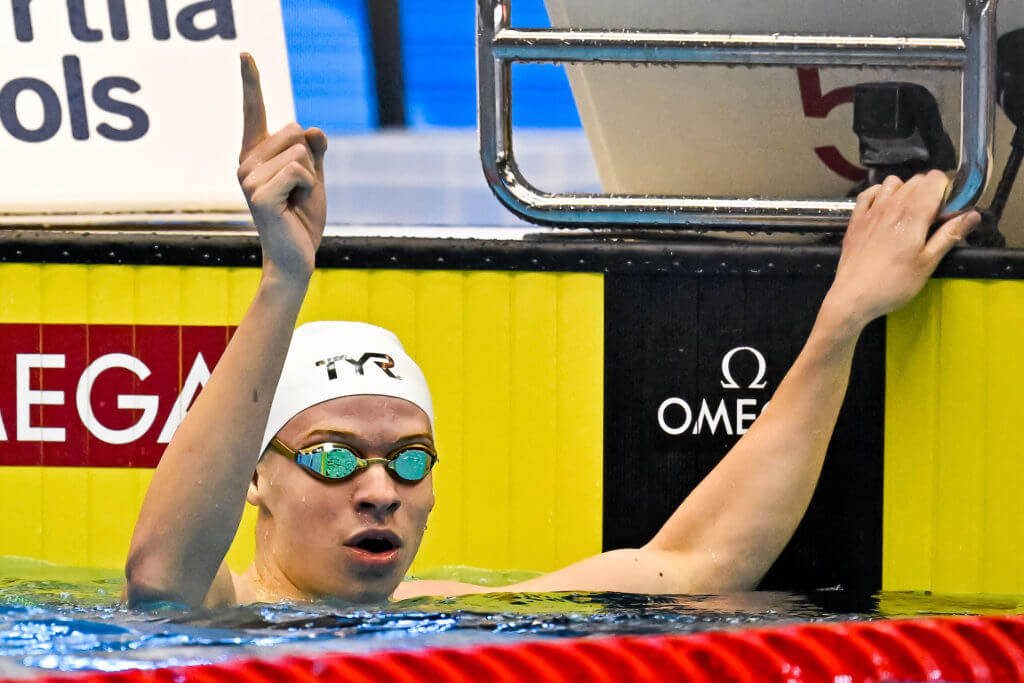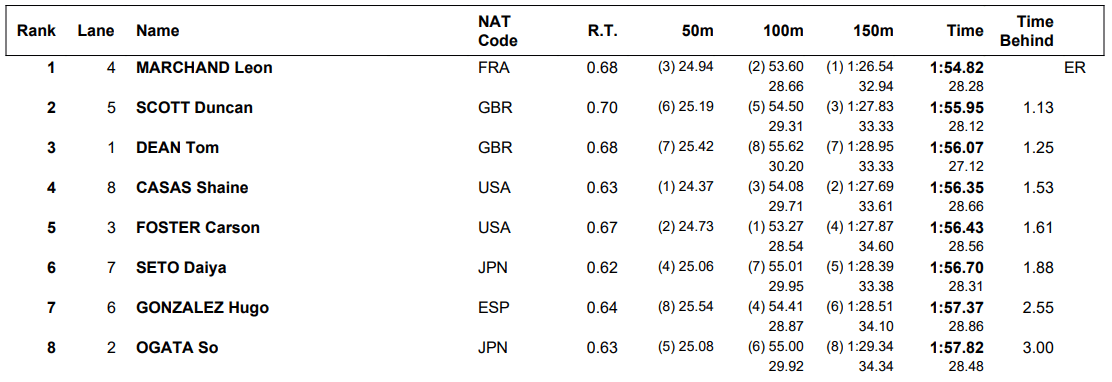World Championships, Day Five Finals: Leon Marchand Pops European Record On Way to Gold In 200 Medley

Editorial content for the 2023 World Aquatics Championships is sponsored by FINIS, a longtime partner of Swimming World and leading innovator of suits, goggles and equipment. World Championships, Day Five Finals: Leon Marchand Pops European Record On Way to Gold In 200 Medley Call it a performance that was expected. Call it an effort that was desired. Call it an outing that officially sends Leon Marchand into the Olympic year as the most-dominant male athlete in the sport. On the back of earlier titles in the 400-meter individual medley and 200 butterfly, Marchand established a European record of 1:54.82 in the 200 individual medley at the World Championships on Thursday night. That performance made the French star just the third man in history to break the 1:55 barrier, joining Americans Ryan Lochte and Michael Phelps. It also erased the 2009 Euro record of Hungarian Laszlo Cseh, who held the mark at 1:55.18. Marchand executed a well-designed race, moving through the butterfly leg in third place and moving up to second on the backstroke leg. As expected, Marchand turned to his breaststroke to pull away from the field. At the 150-meter mark, Marchand was just .03 behind the world-record pace of Lochte. At least for now, the global standard of 1:54.00 proved out of reach, but it gives Marchand something to target in the days ahead. It was a British sweep of the silver and bronze medals, thanks to the efforts of Duncan Scott and Tom Dean. Contesting his only individual event of the meet, Scott touched for second place in 1:55.95. En route to the bronze medal in 1:56.07, Dean put together a furious charge on the freestyle leg, as his split of 27.12 moved him up from seventh. The American duo of Shaine Casas (1:56.35) and Carson Foster (1:56.43) were fourth and fifth. Opting to bypass the 200 breaststroke until a future day, Marchand’s individual program came to an end at the Marine Messe Hall. Relay duty still awaits over the next few days, but the solo work is complete and it could not have gone any better. Three events. Two world records. A third personal best. Really, it was 2,000 meters of excellence, a confidence-building step onto the road to a home Olympiad in Paris. When Lochte set the world record at the 2011 edition of the World Championships in Shanghai, he had Phelps to push him through all four laps. While Lochte produced a mark of 1:54-flat, Phelps was just behind in a career-best of 1:54.16. While Marchand trailed early, he did not have a rival to challenge him over the back half of the race. Once Marchand completes his relay responsibilities in Fukuoka, he’ll eventually return to the Arizona State University campus and his junior year in Tempe. The Mona Plummer Aquatic Center will be the laboratory, and coach Bob Bowman will don his white coat and resume his role as an always-tinkering scientist. What can be done to have Marchand in optimal form for his second Olympic Games? It’s a simple question, albeit a query with detailed answers. Bowman has been down this road on multiple occasions, overseeing the preparation of several athletes for Olympic success. The blueprint for Marchand will be partially gleaned from Bowman’s experiences with Phelps and how to prep an athlete for a multi-event program and the non-athletic demands of the Olympic Games – media requirements, doping control, dietary needs and pressure. Without question, Bowman will not overlook an element of readiness. “I think (Marchand) has one really good thing in his corner and that’s Bob,” Phelps said in an exclusive interview with Swimming World. “I mean, Bob watched every step of my career, and I think he’s in a better spot now than he was then. He’s more relaxed, more laid back. But Bob is the maestro. He’s probably been planning for this for years. He’s not going to miss a step and he’ll probably do it in a more productive way than we did it. And I don’t mean that in a bad way. We learned so much in the process.” Scott and Dean provided a major bright spot for Great Britain. While Scott pushed the pace to give himself a chance at a medal, Dean accepted that he would face a deficit heading into the freestyle leg. But he also knew he could track down some foes with his closing speed. “The last 50, I knew I was just going to have to take off,” Dean said. “The freestyle leg, it’s the same as the (200 free). That’s where all the action happens. It’s where you can get bodies and people die. With the training we were doing, I knew if I exploded down that last length, I could catch guys.” It’s been an up and down week for Great Britain. On the opening day, a disqualification in the prelims of the 400 freestyle relay denied the Brits from chasing the title they were favored to win. But a gold-silver surge by Matt Richards and Dean in the 200 freestyle produced a positive. Scott was forced to miss last year’s World Championships after a bout of Covid-19. Consequently, he was eager to return to the international stage. “I was absolutely gutted to miss out on it last year,” Scott said. “What I love to do is compete on the highest stage, and not getting to do that last year was really upsetting. It’s the first time I’ve raced some of those boys. A lot of them are really young – Carson, Leon, and then the first time on an international stage with Dean-O. I was really happy to be back on the mix.”







